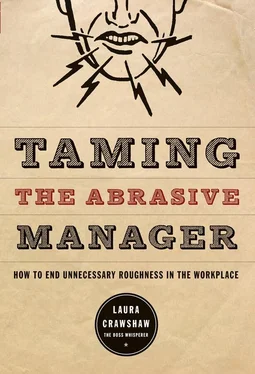Laura Crawshaw - Taming the Abrasive Manager
Здесь есть возможность читать онлайн «Laura Crawshaw - Taming the Abrasive Manager» — ознакомительный отрывок электронной книги совершенно бесплатно, а после прочтения отрывка купить полную версию. В некоторых случаях можно слушать аудио, скачать через торрент в формате fb2 и присутствует краткое содержание. Жанр: unrecognised, на английском языке. Описание произведения, (предисловие) а так же отзывы посетителей доступны на портале библиотеки ЛибКат.
- Название:Taming the Abrasive Manager
- Автор:
- Жанр:
- Год:неизвестен
- ISBN:нет данных
- Рейтинг книги:3 / 5. Голосов: 1
-
Избранное:Добавить в избранное
- Отзывы:
-
Ваша оценка:
- 60
- 1
- 2
- 3
- 4
- 5
Taming the Abrasive Manager: краткое содержание, описание и аннотация
Предлагаем к чтению аннотацию, описание, краткое содержание или предисловие (зависит от того, что написал сам автор книги «Taming the Abrasive Manager»). Если вы не нашли необходимую информацию о книге — напишите в комментариях, мы постараемся отыскать её.
Taming the Abrasive Manager — читать онлайн ознакомительный отрывок
Ниже представлен текст книги, разбитый по страницам. Система сохранения места последней прочитанной страницы, позволяет с удобством читать онлайн бесплатно книгу «Taming the Abrasive Manager», без необходимости каждый раз заново искать на чём Вы остановились. Поставьте закладку, и сможете в любой момент перейти на страницу, на которой закончили чтение.
Интервал:
Закладка:
Jossey-Bass also publishes its books in a variety of electronic formats. Some content that appears in print may not be available in electronic books.
Library of Congress Cataloging-in-Publication Data
Crawshaw, Laura, 1953–
Taming the abrasive manager : how to end unnecessary roughness in the workplace / Laura Crawshaw.
p. cm.
Includes bibliographical references and index.
ISBN 978-0-7879-8837-1 (cloth)
1. Managing your boss. 2. Organizational behaviour. 3. Interpersonal relation. I. Title
HF5548.83.C73 2007
650.1 3—dc22
2007011826
FIRST EDITION
The Jossey-Bass
Business & Management Series
[T]he fear . . . struck into their hearts was too deep to be dislodged. . . . [T]here were those . . . who understood this. They could see into the creature’s soul and soothe the wounds they found there. . . . For secrets uttered softly into . . . troubled ears, these . . . were known as Whisperers.
—Nicholas Evans, The Horse Whisperer
The Author
Laura Crawshaw received her MSW degree in clinical social work from the Smith College School for Social Work and conducted postgraduate studies at the Seattle Institute for Psychoanalysis and Harvard Community Health Plan. She completed both MA and PhD degrees in human and organizational systems at Fielding Graduate University. Laura founded the Executive Insight Development Group in 1994, an international firm offering psychodynamically based coaching services for abrasive leaders and dysfunctional teams; Executive Insight has served an international clientele of corporations, including over forty Fortune 500 companies. With over thirty years’ experience as a psychotherapist, corporate officer, and executive coach, Laura now focuses her research and practice on the reduction of workplace suffering. She is a member of the International Society for the Psychoanalytic Study of Organizations, the American Psychological Association, and the International Coach Federation. Laura particularly enjoys the company of human and nonhuman members of the animal kingdom. She can be contacted at www.executiveinsight.com .
This book is dedicated to my wonderful parents, without whose love, humor, and insight I would not be who and where I am today; to two great bosses, Darryl Logan and Jay Youell; and to my coaching clients, who had the courage to change.
I also wish to thank my dear friends who supported me on this journey, and those members of the animal kingdom who allowed me to share in their worlds, especially members of the species Ursus arctos horribilis and Canis lupus familiarus puggus.
Finally, thanks to my editor and expert author whisperer, Neal Maillet, who knew exactly how to tame my anxieties.
Introduction
I’m too impatient to read book introductions—why waste time reading about what I’m about to read? Why not just cut to the chase and get to the meat of the matter? I’m sure I’ve missed some important information in these books because of my carnivorous reading style, but because I can’t stand to wade through lengthy introductions, I’m going to make this short.
You’re reading this book because you
Manage someone who is abrasive
Work with someone who is abrasive
Work for someone who is abrasive
In other words, you are the superior, peer, or subordinate of an abrasive manager. You are tired, frustrated, and distressed. You have either tried everything you can think of to tame the abrasive manager’s aggressive behavior, to no avail, or you are too afraid to try anything, for fear of what could happen. This book is written for you.
You already know a few things about abrasive managers (or abrasive bosses , as I refer to them in this book) from your own experience. You know that they’re usually blind to their destructive impact on coworkers (‘‘they just don’t get it—they just don’t see’’), and if they do see, they don’t seem to care.
To have any hope of taming an abrasive boss, you need to know why these bosses do what they do and what you can (and can’t) do about it. With the help of this book, which is based on my years of research with abrasive bosses and their coworkers, you’ll learn how to make them see the damage they inflict and how to make them care enough to rein in their aggressive behavior. Now, let’s cut to the chase. . .
1 Abrasive Bosses and the Working Wounded
Abrasive bosses rub their coworkers the wrong way. Their words and actions create interpersonal friction that grates on subordinates, peers, and superiors, grinding away at trust and motivation. Abrasive bosses can inflict deep wounds and intense suffering in employees. The pain of working with an abrasive boss is often felt by the company as well, eroding effectiveness and paralyzing productivity. Few of us have escaped the pain of working under, over, or with an abrasive boss, and far too many of us have unwillingly entered the ranks of what I have come to call the working wounded .
I coach abrasive bosses of all kinds: executives, managers, supervisors, and professionals (physicians, attorneys, others) whose disruptive behaviors cause profound emotional distress in the people they work with. Over the past two decades I have had the opportunity to closely observe how and why these abrasive bosses rub coworkers the wrong way. I’ve also examined the individual and organizational wounds they inflict, listening to the pain experienced by their subordinates, peers, and superiors and, believe it or not, by the abrasive bosses themselves. I’ve written this book to share my observations and offer my insights on why abrasive bosses resort to aggression, why individuals and organizations fail to intervene effectively, and, most important, what you can (and can’t) do about it. In medicine, abrasion refers to the physical trauma sustained when exposed skin rubs against a rough surface. In this book, workplace abrasion refers to the psychological trauma sustained when employees are exposed to the unnecessary roughness of an abrasive boss. Both scenarios produce suffering.
It Only Hurts When I Work
Suffering is a term rarely applied in the workplace. It’s one of those emotionally loaded (also referred to as touchy-feely ) words that seem out of place at work. Aren’t we supposed to leave our emotions at the door so we can get on with business? Workplace suffering ? Employers don’t want to hear about it because they don’t want to be perceived as perpetrators of suffering—they’re there to get the job done, and social services aren’t part of that picture. Second, it’s a given that we all were meant to suffer at work—right? Showing up day after day to plug away at tasks we don’t necessarily enjoy with people we don’t necessarily like is a pain, a pain that most of us can’t afford to avoid. What lottery winner doesn’t jubilantly declare that his or her first act will be to quit work? Unless we are lucky enough to love what we do and the people we do it with, we endure the assorted discomforts of work to pay the bills and keep the wolves from the door. So since when isn’t work supposed to be painful?
Work can be painful for other reasons, including the actual nature of the work. Early man learned early on that woolly mammoth hunts were no picnic if you were the one who ended up trampled or impaled. And it seems pretty obvious that pyramid building was no easy task for your average Aztec or Egyptian laborer. As a kid I remember teachers warning us of the physical and mental suffering we would endure digging ditches or screwing caps on toothpaste tubes if we failed to hit the books. It’s not only the nature of the work that can be unpleasant or uninteresting, causing physical or emotional suffering—work can also hurt because of the circumstances surrounding our jobs: weak wages, bleak benefits, bad schedules, or looming layoffs. In short, work can be a pain.
Читать дальшеИнтервал:
Закладка:
Похожие книги на «Taming the Abrasive Manager»
Представляем Вашему вниманию похожие книги на «Taming the Abrasive Manager» списком для выбора. Мы отобрали схожую по названию и смыслу литературу в надежде предоставить читателям больше вариантов отыскать новые, интересные, ещё непрочитанные произведения.
Обсуждение, отзывы о книге «Taming the Abrasive Manager» и просто собственные мнения читателей. Оставьте ваши комментарии, напишите, что Вы думаете о произведении, его смысле или главных героях. Укажите что конкретно понравилось, а что нет, и почему Вы так считаете.












